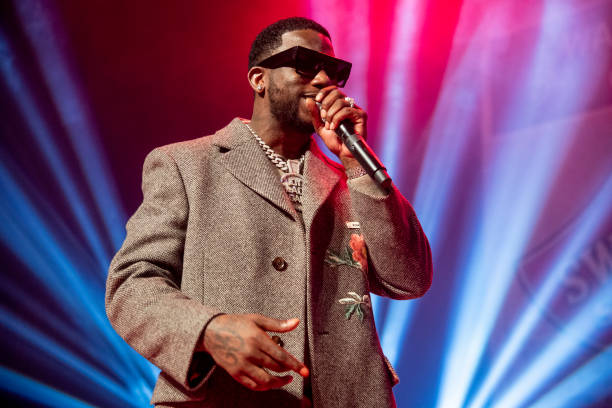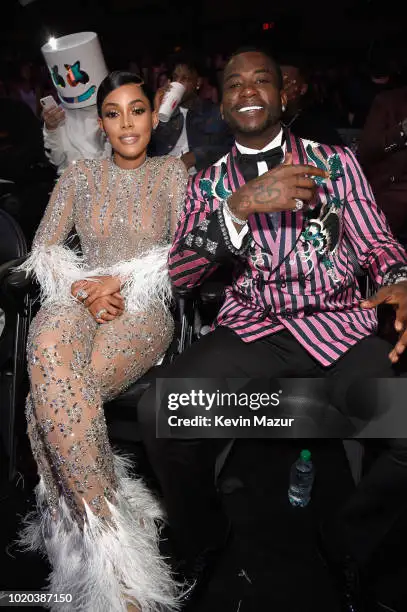The Resilient Architect of Trap Music

In the realm of hip-hop, few figures are as iconic and influential as Gucci Mane. Born Radric Delantic Davis on February 12, 1980, in Bessemer, Alabama, Gucci Mane’s journey from the streets of Atlanta to becoming a trailblazer in the music industry is a story of grit, resilience, and relentless innovation. Known as one of the pioneers of trap music, Gucci Mane’s impact on the genre and culture is undeniable, marked by his prolific output, distinctive style, and ability to constantly reinvent himself.
Gucci Mane’s early years were shaped by a combination of hardship and creativity. Raised primarily by his mother, Vicky Davis, after his parents separated, he moved to Atlanta at the age of nine. It was in Atlanta, a city with a burgeoning hip-hop scene, that Gucci Mane found his passion for music. Despite his talent and ambition, his teenage years were fraught with challenges, including brushes with the law and involvement in drug dealing. These experiences, while difficult, would later provide the raw material for his gritty and authentic lyrical style.
 In 2001, Gucci Mane began to make a name for himself in Atlanta’s underground rap scene. His early mixtapes caught the attention of local audiences, showcasing his unique blend of Southern drawl, vivid storytelling, and charismatic delivery. However, it was his debut album, “Trap House,” released in 2005, that truly put him on the map. The album’s lead single, “Icy,” featuring Young Jeezy, became a regional hit and introduced the world to Gucci Mane’s signature sound.
In 2001, Gucci Mane began to make a name for himself in Atlanta’s underground rap scene. His early mixtapes caught the attention of local audiences, showcasing his unique blend of Southern drawl, vivid storytelling, and charismatic delivery. However, it was his debut album, “Trap House,” released in 2005, that truly put him on the map. The album’s lead single, “Icy,” featuring Young Jeezy, became a regional hit and introduced the world to Gucci Mane’s signature sound.
“Trap House” was more than just an album; it was a declaration of a new genre. The term “trap” refers to the drug trade, and Gucci Mane’s music vividly depicted the realities of life in the trap, from the hustle and danger to the fleeting moments of triumph. His raw, unfiltered narratives resonated with listeners, establishing him as a voice of authenticity in hip-hop.
Following the success of “Trap House,” Gucci Mane released a series of albums and mixtapes that solidified his reputation as a prolific and innovative artist. Albums like “Hard to Kill” (2006) and “Back to the Trap House” (2007) continued to build on his growing legacy, while his numerous mixtapes, often released with little warning, kept his fans eagerly anticipating his next move. Gucci Mane’s work ethic was legendary; he became known for his ability to churn out music at an astonishing rate, often recording multiple songs in a single day.
Despite his musical success, Gucci Mane’s career was plagued by legal troubles and personal struggles. He faced numerous arrests and spent significant time in and out of prison. These challenges, while daunting, did not deter him. Instead, they seemed to fuel his creative fire. Songs like “First Day Out,” recorded shortly after his release from jail, captured the raw emotion and determination that characterized his journey.
 In 2009, Gucci Mane released “The State vs. Radric Davis,” an album that would become one of his most commercially successful projects. The album featured hit singles like “Wasted” and “Lemonade,” which showcased his ability to create infectious hooks and memorable beats. “Lemonade,” in particular, became a cultural phenomenon, its distinctive beat and catchy lyrics cementing Gucci Mane’s status as a mainstream star.
In 2009, Gucci Mane released “The State vs. Radric Davis,” an album that would become one of his most commercially successful projects. The album featured hit singles like “Wasted” and “Lemonade,” which showcased his ability to create infectious hooks and memorable beats. “Lemonade,” in particular, became a cultural phenomenon, its distinctive beat and catchy lyrics cementing Gucci Mane’s status as a mainstream star.
 Gucci Mane’s influence extended beyond his own music. He played a crucial role in the careers of many emerging artists, serving as a mentor and collaborator. Figures like Young Thug, Migos, and Future have all cited Gucci Mane as a significant influence, and his ability to recognize and nurture talent has left a lasting mark on the hip-hop landscape.
Gucci Mane’s influence extended beyond his own music. He played a crucial role in the careers of many emerging artists, serving as a mentor and collaborator. Figures like Young Thug, Migos, and Future have all cited Gucci Mane as a significant influence, and his ability to recognize and nurture talent has left a lasting mark on the hip-hop landscape.
In 2014, Gucci Mane was sentenced to prison once again, this time for a two-year stint. It was during this period that he underwent a personal transformation. Upon his release in 2016, fans were greeted with a new Gucci Mane—physically fit, mentally focused, and creatively rejuvenated. His comeback album, “Everybody Looking,” debuted at number two on the Billboard 200, signaling his triumphant return to the music scene.
This new chapter in Gucci Mane’s career was marked by both personal and professional growth. He married Keyshia Ka’oir in a lavish ceremony that was widely publicized, and he continued to release critically acclaimed music. Albums like “Mr. Davis” (2017) and “Evil Genius” (2018) showcased his evolved sound and maturity, while collaborations with artists like Drake, Bruno Mars, and Lil Yachty kept him relevant in an ever-changing industry.
Gucci Mane’s autobiography, “The Autobiography of Gucci Mane,” released in 2017, provided an intimate look at his life and career. The book, co-written with journalist Neil Martinez-Belkin, detailed his struggles with addiction, his time in prison, and his journey to redemption. It was a candid and inspiring story of resilience and reinvention, resonating with fans and critics alike.
Beyond music, Gucci Mane has also made a significant impact on fashion and culture. His bold style, characterized by flamboyant outfits and extravagant jewelry, has made him a fashion icon. He has collaborated with major brands like Gucci and Reebok, further cementing his influence in the cultural zeitgeist.
As of today, Gucci Mane continues to be a dominant force in hip-hop. His label, 1017 Records, has become a launching pad for new talent, ensuring his legacy will endure for years to come. His story, from the streets of Atlanta to the heights of music stardom, is a testament to the power of perseverance and the ability to transform adversity into triumph.
Gucci Mane’s impact on hip-hop and culture is immeasurable. He is not just a rapper; he is a visionary who has redefined the genre and inspired countless artists to follow in his footsteps. His journey is one of relentless hustle, unyielding creativity, and an unwavering belief in himself. In the ever-evolving world of hip-hop, Gucci Mane stands as a beacon of resilience, a true architect of trap music, and a symbol of the transformative power of art.
TOP
